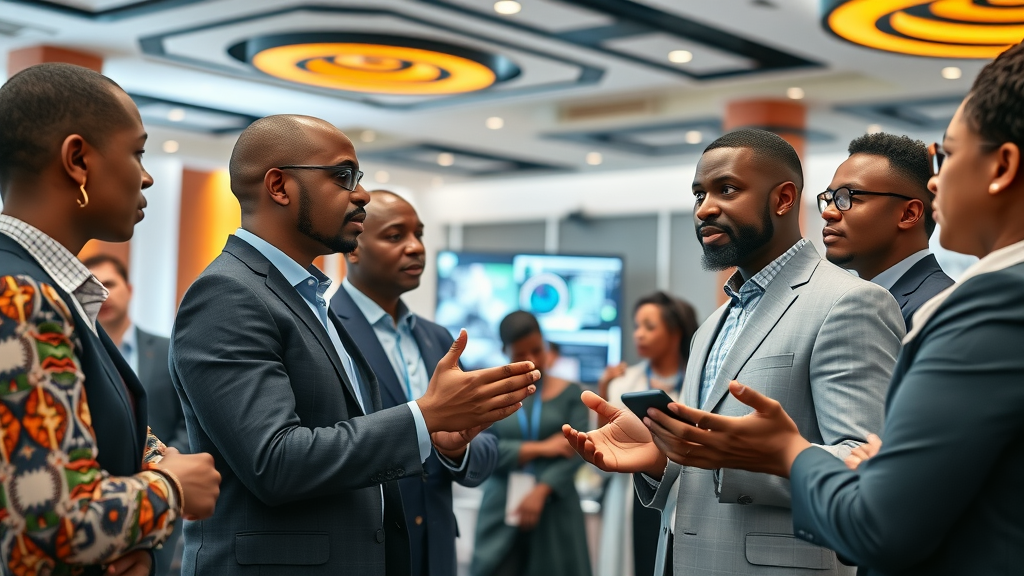Did you know that the next big AI innovation could be created in Africa? Strive Masiyiwa AI Africa initiatives are at the forefront of this revolution, unlocking unprecedented access to critical compute resources that power AI development. This article dives deep into Masiyiwa’s visionary efforts to democratize GPU compute time , enabling African innovators to create transformative AI solutions. Whether you’re an aspiring AI entrepreneur or simply curious about the future of AI in Africa, discover how this continent is poised to become a global AI powerhouse.
Startling Growth of AI Innovation in Africa
The surge in African AI innovation is nothing short of remarkable. Over recent years, thousands of new AI developers have emerged, signaling a continent ready to lead in next-generation technology. “I would not be surprised if the next TikTok will be an AI solution out of Africa,” a leading US AI expert remarked, highlighting the burgeoning talent pool and rapid adoption of AI technologies. This trend is disrupting outdated perceptions and signaling a seismic shift in Africa's role in the AI landscape.
Many observers previously underestimated Africa’s technological potential, assuming infrastructural and economic barriers would restrain innovation. However, the reality is very different. Driven by youthful ambition and ingenuity, African developers are leveraging AI not only for global applications but also to solve unique continental challenges—from health services to fintech and agritech. This dynamic growth underscores the importance of accessible infrastructure to harness such talent effectively.

Strive Masiyiwa’s Vision for Africa’s AI Factory and Infrastructure
Strive Masiyiwa, founder and Executive Chairman of Econet Group, is spearheading a transformative vision for AI infrastructure in Africa. At the heart of his strategy is the establishment of a business model that allows anyone to rent GPU compute time simply and affordably. In his own words, “We have now set up a business which will allow anyone to simply rent compute time and develop any AI workload to build a beautiful product.” This initiative addresses one of the biggest hurdles facing AI developers on the continent — access to capital-intensive compute resources.
By democratizing compute power, Masiyiwa is enabling innovators of all scales to experiment with complex AI models that were once beyond reach. This approach paves the way for a flourishing ecosystem of AI startups and applications across multiple sectors. The scalable infrastructure ensures that AI development is no longer reserved for well-funded multinational companies but accessible to grassroots innovators driving local solutions.

The Role of AI Infrastructure in Accelerating Innovation
AI infrastructure, especially compute accessibility, is a linchpin in Africa’s innovation trajectory. Without affordable and scalable access to GPUs, AI development can be prohibitively expensive and slow. Masiyiwa’s initiative essentially removes this barrier, empowering African developers to focus on creativity and problem-solving rather than infrastructure logistics.
Furthermore, AI infrastructure enables rapid prototyping, testing, and deployment of AI models that can address Africa-specific challenges such as disease diagnosis, agricultural optimization, and financial inclusion. Masiyiwa’s pioneering efforts highlight that infrastructure is not merely about technology but fostering an environment where ideas can evolve into impactful solutions efficiently.
Augmenting Human Capabilities: The AI Revolution in Africa
Contrary to common fears, AI in Africa is poised not to replace human labor but to augment it. Masiyiwa underscores this sentiment, stating, “The future of AI is not about replacing humans; it’s about augmenting human capabilities.” AI technologies hold the promise of enhancing productivity, improving decision-making, and expanding possibilities for human creativity and entrepreneurship.
African innovators are harnessing AI to create applications that amplify skills and address enduring socio-economic challenges. These include AI-powered healthcare diagnostics increasing rural access to quality care, fintech solutions accelerating financial inclusion, and education platforms tailored to local languages and contexts.

Examples of AI Applications Emerging from Africa
The breadth of AI applications emerging in Africa illustrates the continent’s growing leadership in this space. From predictive analytics to combat disease outbreaks, AI-driven fintech platforms providing microloans without traditional banking barriers, to agritech apps that use AI to optimize crop yields—these innovations transform everyday life. Many of these solutions rely heavily on accessible compute power to run sophisticated machine learning models efficiently.
Startups utilizing Masiyiwa’s GPU rental services are developing AI algorithms tailored to Africa’s unique needs, which can then scale globally. This convergence of infrastructure and entrepreneurial drive ensures Africa's AI solutions are both context-relevant and internationally competitive.
Overcoming Barriers: Compute Accessibility as a Catalyst
One of the longstanding challenges for AI innovation in Africa has been limited access to affordable and reliable computing resources. GPUs, essential for machine learning tasks, have traditionally been scarce or too costly. Masiyiwa’s initiative to provide rental compute time addresses this capital barrier head-on, acting as a catalyst for a new wave of AI development.
With affordable GPU access, startups can significantly reduce upfront investments, focus on developing innovative AI products, and accelerate their time to market. This democratization of compute resources is essential in nurturing a sustainable AI ecosystem and in bridging the global technology divide.

Strive Masiyiwa’s Strategic Move to Democratize Compute Power
Masiyiwa’s approach is more than technological innovation; it is a strategic move to democratize AI development by eliminating a critical financial and infrastructural bottleneck. The availability of rentable GPU hours means AI workloads can flourish even in resource-constrained settings, enabling a wider range of innovators to experiment, iterate, and innovate.
By opening up access, Masiyiwa ensures that African AI talent is not stifled by resource limitations but fuelled by opportunity, positioning Africa as a vibrant hub for global AI innovation.
Harnessing Youth and Innovation for Africa’s AI Future
Youth are the driving force behind Africa's AI revolution. Strive Masiyiwa encourages young innovators by stating, “Use your youth to hyperdrive your mind to find solutions, rather than see only problems and limitations.” The continent’s large young population represents an unparalleled resource primed to apply their creativity and skills to AI development.
Empowering youth with accessible AI infrastructure and mentorship cultivates a new generation of problem solvers who are confident, capable, and ready to lead Africa's AI transformation. Supporting this demographic through education, compute access, and community engagement will ensure sustainable growth.

What You’ll Learn
- The current state and growth of AI innovation in Africa
- How compute accessibility is unlocking AI potential
- Strive Masiyiwa’s role and vision in Africa’s AI revolution
- Practical examples of AI applications transforming African industries
- Actionable insights for aspiring AI entrepreneurs in Africa
Common Misconceptions and Challenges in Africa’s AI Landscape
Despite promising strides, Africa’s AI landscape faces several misconceptions and real challenges. These include the assumed insurmountability of infrastructure deficits, the belief that AI is an elitist field inaccessible to most, and concerns over funding and skills shortages. However, initiatives like Masiyiwa’s are actively dispelling these myths by delivering practical solutions.
Challenges such as intermittent internet, high cost of GPUs, and limited AI training programs remain, but the growing network of data centers, skills development initiatives, and compute rentals directly target these. Understanding these issues in context is critical for realistic expectations and sustainable solutions for Africa’s AI future.

Actionable Tips for Aspiring AI Innovators in Africa
- Identify everyday problems that AI can solve to ensure relevance and impact.
- Leverage accessible compute resources like GPU rental services to reduce startup costs.
- Build specialized skills through training and collaborate actively with local AI communities.
- Stay informed on AI trends and emerging technologies to remain competitive.
- Take initiative and lead innovation efforts with confidence and creativity.
People Also Ask
- What is Strive Masiyiwa’s contribution to AI in Africa? He is enabling affordable compute access and fostering AI development infrastructure across the continent.
- How does compute accessibility impact AI development? It removes financial and logistical barriers, accelerating innovation and product development.
- What industries in Africa are benefiting from AI? Healthcare, fintech, agritech, education, and gaming are among the leading sectors.
- How can young entrepreneurs get involved in AI innovation? By leveraging available training, compute rentals, and engaging with local AI communities.
- What challenges does Africa face in AI adoption? Infrastructure gaps, skills shortages, and funding limitations remain critical barriers.
| Challenge | Description | Potential Solution |
|---|---|---|
| Limited Compute Resources | High cost and limited access to GPUs restrict AI development. | GPU rental services by Econet Group provide affordable, scalable compute power. |
| Skills Gap | Shortage of AI-trained professionals impedes adoption and innovation. | Training programs and community initiatives cultivate local talent. |
| Infrastructure | Inadequate internet connectivity and unreliable power supply hinder AI projects. | Investment in data centers and renewable energy improves reliability. |
| Funding | Limited venture capital available for AI startups restricts growth. | Government and private sector partnerships stimulate investment and support. |
Key Takeaways
- Africa is rapidly emerging as a hub for AI innovation with global potential.
- Strive Masiyiwa’s initiatives are critical in democratizing AI compute power across Africa.
- AI will augment human capabilities, enhancing productivity and problem-solving in multiple industries.
- Youth and entrepreneurs are the backbone of Africa’s promising AI future.
- Overcoming infrastructure, skills, and funding challenges is essential for sustained AI growth.
Conclusion: The Next Move for Africa’s AI Revolution
Strive Masiyiwa’s commitment to unlocking compute accessibility marks a pivotal turning point in Africa’s AI journey. By removing the capital barriers to GPU access, he empowers a broad spectrum of innovators ready to tackle local and global challenges using AI. The continent stands on the cusp of an AI renaissance, fueled by youthful energy, visionary leadership, and practical infrastructure solutions.
The future of AI in Africa is bright — it is an inclusive future where technology amplifies human potential and unleashes creativity across all sectors. As Masiyiwa urges, it’s not enough to witness this transformation; Africa’s young innovators must seize the moment, lead the innovation, and build remarkable AI solutions that resonate worldwide.
Discover More on Africa’s AI and Technology Landscape
Stay tuned to emerging news, join local AI communities, and explore further resources to trust in Africa’s enduring AI potential fueled by compute accessibility and visionary leadership alike.
 Add Row
Add Row  Add
Add 




Write A Comment